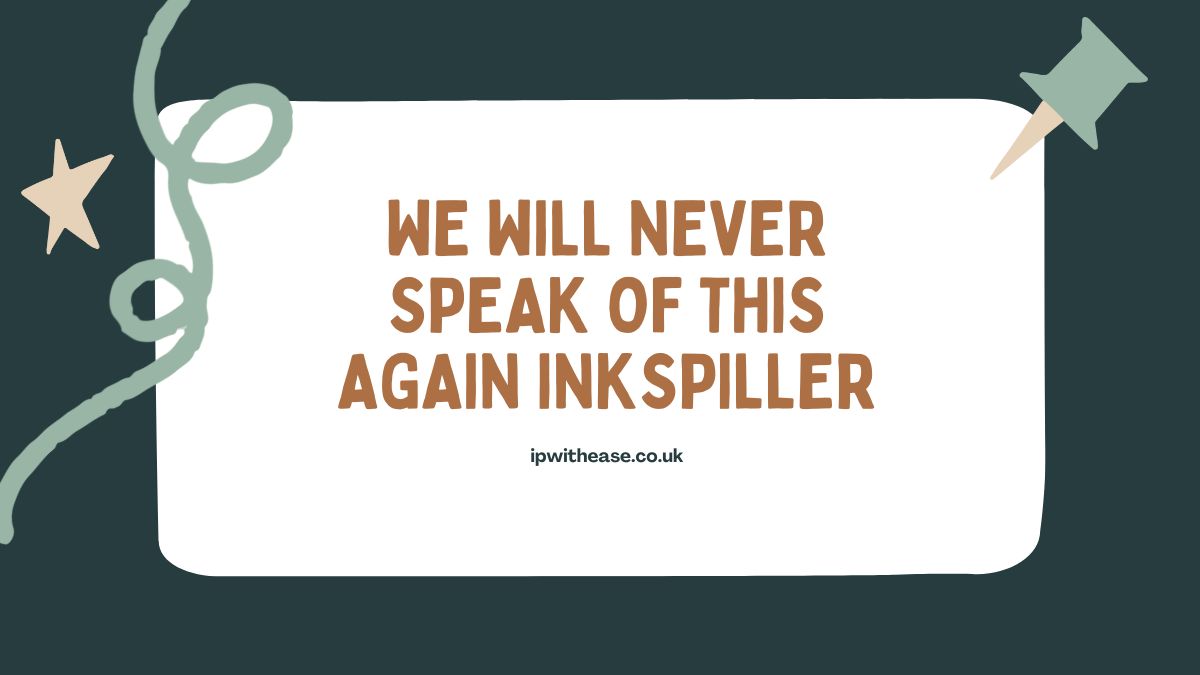Introduction
Have you ever come across a piece of writing so captivating yet mysterious that it leaves you with lingering questions? There’s a unique charm in stories that keep secrets from their readers, subtly alluding to truths left unsaid. This is the essence of the phrase “We will never speak of this again inkspiller.” It’s a pact between the writer and the reader—a commitment to explore the hidden, untold parts of life without fully exposing them. Let’s dive into what it means to be an “inkspiller,” the art of unspoken storytelling, and why the allure of secrecy makes literature so powerful.
What Does “We Will Never Speak of this Again Inkspiller” Mean?
The term “We will Never Speak of this Again Inkspiller” refers to anyone who tells stories with the written word. It captures the romanticized image of a writer who pours their emotions, secrets, and sometimes untold stories onto the page. To be an ink spiller means to navigate both revelation and discretion, often weaving personal truth with fiction in ways only they can understand.
The Power of Unspoken Words in Writing
We will Never Speak of this Again Inkspiller, the stories they create are outlets for emotions and experiences they can’t share openly. When an ink spiller chooses not to reveal everything, it leaves a space for the reader to fill with their own interpretations, making the story feel deeply personal. It’s a silent conversation between writer and reader, where some things are better left unsaid.
Unspoken Truths in Literature
Some of the most compelling stories in literature are built around secrets and untold truths. Think of novels where characters harbor hidden motives or secret pasts that are never fully revealed. This sense of mystery pulls readers in, making them feel like they’re part of an exclusive club, privy to only part of the story and left to wonder about the rest.
The Secret Life of a Writer
Writers often find themselves sharing parts of their own stories with their characters. However, they may choose to mask these personal truths in metaphors, symbolism, or fictionalized scenarios. This blend of honesty and mystery allows them to be vulnerable without exposing themselves completely, creating a delicate balance that defines much of literary art.
“We will Never Speak of this Again Inkspiller”: An Unspoken Pact
The phrase “we will never speak of this again” resonates as an unspoken promise between writer and reader. It’s the understanding that not every element of a story needs to be explicit. This hint of secrecy and trust invites readers to respect the mystery, making the story more engaging and memorable.
Inkspiller as an Escape and Confessional
We Will Never Speak of This Again Inkspiller authors to express things they might not openly discuss. Through their stories, they can approach sensitive subjects, taboo topics, or buried emotions, veiling them in characters and narratives that only partially reveal the truth. This confessional aspect gives writing a therapeutic quality while preserving the writer’s sense of privacy.
Secrets We Keep as Readers
As readers, we sometimes interpret stories in ways we don’t share with others. Maybe a passage strikes a personal chord, or a hidden meaning resonates with our experiences. We hold onto these private interpretations, savoring the silent connection we feel to the text, adding layers to our reading experience that remain uniquely ours.
Unspoken Narratives in Poetry
We will Never Speak of this Again Inkspiller often conveys profound emotions through metaphor and brevity, leaving much to the reader’s imagination. Many poets craft their work with an openness to interpretation, embedding hidden messages that each reader can decode differently, adding a layer of intimacy to the reading experience.
Why We Love Hidden Stories in Art
Whether it’s literature, film, or visual art, audiences are often drawn to works that carry hidden messages. This allure of secrecy creates an experience that feels interactive as if the reader or viewer is discovering a secret. It engages us, making us feel like we’re peeling back layers to get closer to the truth.
The Role of Ambiguity in We will Never Speak of this Again Inkspiller
Ambiguity allows for multiple We will Never Speak of this Again Inkspiller, adding richness to a story. By intentionally leaving gaps in their narratives, writers let readers become co-creators of meaning. This not only adds depth but also gives each person a unique experience with the work, making it feel personal.
- How Authors Use Language to Hide and Reveal: Writers use various techniques to suggest hidden meanings without explicitly stating them. From subtle word choices to complex symbolism, language becomes a tool to both reveal and conceal.
- Examples of Hidden Stories in Classic Literature: We will Never Speak of this Again Inkspiller of the greatest works of literature contain unspoken narratives. Consider The Great Gatsby or To Kill a Mockingbird, where the underlying themes are felt through what is left unsaid.
- Balancing Openness and Mystery in Writing: Striking the right balance between revealing and concealing is part of the writer’s craft. Too much transparency can strip a story of its intrigue, while too much secrecy can leave readers confused.
Conclusion
The phrase “We will Never Speak of this Again Inkspiller” is a powerful reminder of the beauty in mystery. As inkspillers, writers have a unique ability to share hidden parts of themselves while keeping certain elements shrouded in secrecy. This balance between revelation and discretion creates a richer, more layered experience for readers, inviting them into a silent partnership with the writer.

